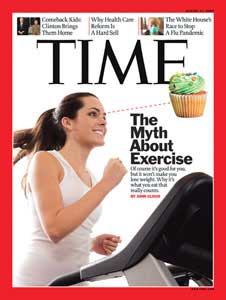 If Time magazine dedicates an entire cover story to it, then it must be big.
If Time magazine dedicates an entire cover story to it, then it must be big.
New research about the benefits of exercise is running counter to the conventional health wisdom we have been taught thus far. While exercise burns calories, which is necessary for weight loss, it also makes us hungry. And what do we do when we are hungry? We eat. And if we know we just clocked a few miles on the treadmill, what do we do then? We give ourselves free license to devour a plate of pasta or chicken quesadillas, and maybe even a piece of tiramisu for those extra crunches we kicked out. The problem is not that we’re eating, but rather the hunger that comes from exercise may be leading us to consume more calories than what we just burned off. This therefore negates our good intentions of creating a calorie deficit in order to lose weight.
The question that health researchers are now asking is, “Is exercise really needed for weight loss?”
The answer may surprise you.
The author of the recent Time magazine cover story, John Cloud, cites a breakthrough study in which women who needed to lose weight were assigned to four different exercise groups, three of which engaged in exercise, one of which did not. The results were eye-opening: The women who exercised for six months with a personal trainer did not lose significantly more weight than those women who did not exercise.
Other researchers have drawn similar conclusions. Gary Taubes, author of Good Calories, Bad Calories, put forth a similar argument citing additional studies. Namely, that in order to lose weight, exercise may not be the magic pill as once thought. But in order to maintain a healthy weight and body, some form of moderate exercise every day, even if it’s just moving more by walking to do errands or biking to work, might fare better at keeping us lean than hitting the gym a few times a week.
According to the Time magazine article, we need to look to our ancestors for the answers. They kept moving consistently throughout the day, not at heart-thumping rates, but steady movements such as walking, laboring and performing daily chores. In fact, as Cloud points out, researchers have shown that rather than sitting on our bums all day at work behind our computers and then trudging to the gym to sweat it out on the elliptical machine for 30 minutes may not be working to our advantage. Instead, engaging in regular bouts of physical activity distributed throughout the day might be a more effective strategy for keeping weight off.
This rather surprising news that exercise may not be so mandatory in the quest to lose weight comes with perils. Information like this can quickly be misconstrued and misinterpreted, by the general public. With 34 percent of the population obese and 32 percent overweight, Americans surely do not need to be told to exercise less in order to improve their health. Exercise has very clear and well-documented benefits. From improving mood to supporting lean muscle mass and to enhancing the quality of sleep, the benefits of exercise cannot, nor should not, be underestimated.
Therefore, public health and medical professionals need to be very vocal about informing the public about the benefits of regular physical activity as a mainstay component of a healthy lifestyle.
